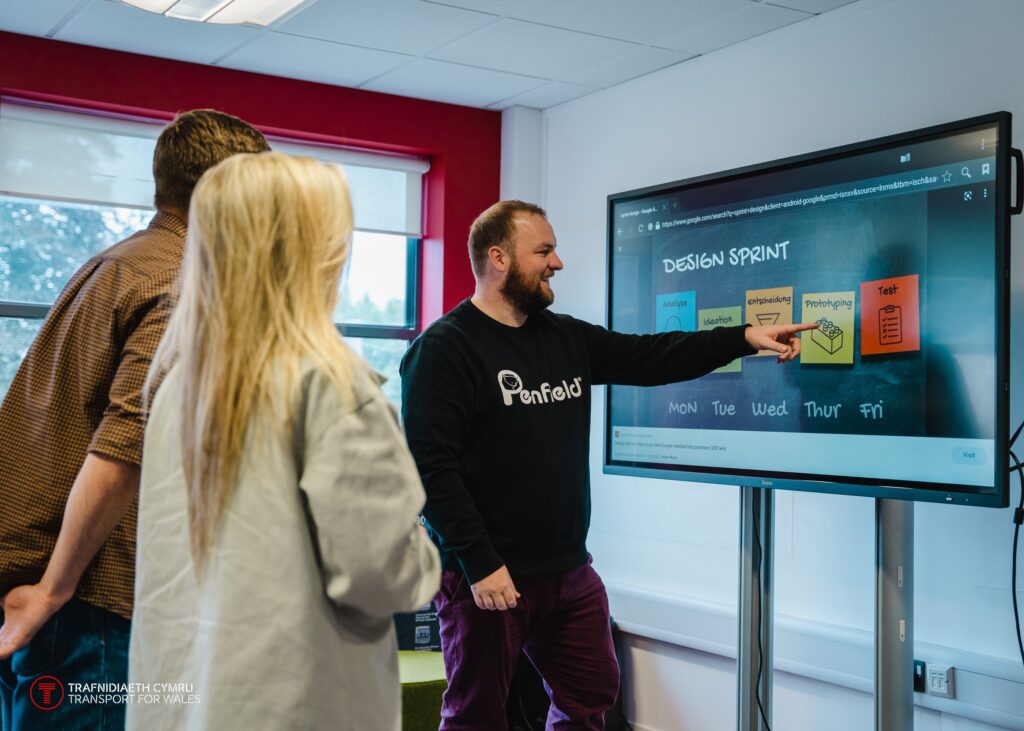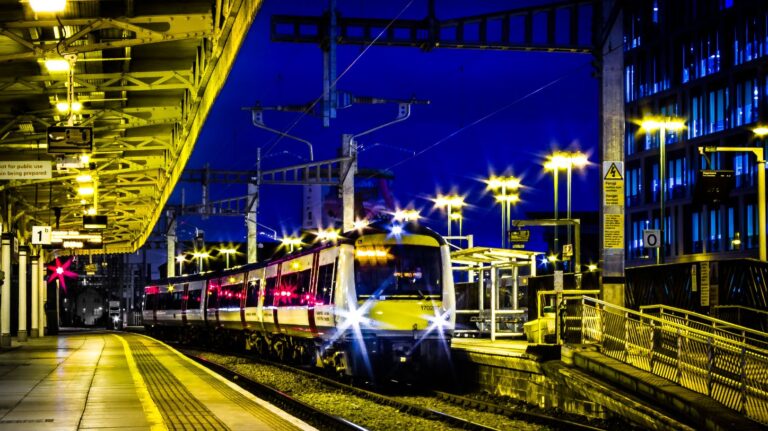Reuben Henry-Fellows examines Lab by Transport for Wales, a pioneering scheme designed to support start-up businesses, stimulate economic growth and improve the customer experience on the rail network…
From a strip of metal-soaked soil along the tramway of Penydarren ironworks, near Merthyr Tydfil in south Wales, the world’s first steam powered railway journey launched on 21 February 1804. Three years later, in 1807, Wales achieved another world rail first, with the original fare-paying passenger rail service operating between Swansea and Mumbles. In the 200+ years since, the ‘land of song’ has become accustomed to the screech of steel against track, transforming into a £3.5bn passenger and freight service provider employing more than 20,000 people.
However, the journey has been far from straight forward. Following years of overspending, the 1963 Beeching Report outlined cuts that sought to reduce the then nationalised British Rail debt. Also known as the ‘Beeching Cuts’, the report’s measures resulted in the closure of 189 Welsh stations. Estimated to have saved £30m with a reduction of £100m in potential revenue across the nation, rail subsidies were introduced to paper over the cracks of this vital yet chronically underfunded public service.
And after decades of failed solutions, British Rail underwent a four-year privatisation process that began and 1997, writing off £300m in public debt with another £200m secured in provisions against future liabilities. Intended to encourage private investment, as of 2024 Network Rail, the owner and infrastructure manager of most of the railway network in Great Britain, holds more than £59bn of debt. Now operating as a highly subsidised, partially private, public service, companies operating within the context of British Rail must contend with increasing costs, stagnating wages, greater demand for limited capacity and shortages of personnel.
However, following the Government of Wales Act 2006, which reformed the then-National Assembly for Wales (now the Senedd), the Welsh government was given the opportunity to take rail ownership into its own hands, which it did in 2016 when it set up Transport for Wales (TfW). In 2018, a contract was awarded to KeolisAmey Wales to operate the Wales and Borders rail service on behalf of TfW. By 2019, more rail services were being operated under the TfW brand on the Welsh network than ever before, including 215 trains running weekly between North Wales and Liverpool, while a further £40m investment to the train fleet saw upgrades such as phone charging points, on-board wi-fi, as well as new seats, carpets and interior fittings.
FAST FACT: The Welsh rail network covers approximately 1,600km of track and includes around 248 stations across Wales. Source: Transport for Wales
In 2020, TfW took ownership of the Core Valley Lines from Network Rail, forming part of the South Wales Metro, an integrated network of bus, rail, wheeling, walking and cycling routes, part-funded by the European Regional Development Fund through the Welsh government, and designed to improve connectivity and make end-to-end sustainable travel easier across the region. However, facing unprecedented challenges from the Covid-19 pandemic, including vastly reduced passenger numbers and revenues, the KeolisAmey Wales franchise was ended and rail services across Wales and its border regions came into public ownership.
TfW Rail was established as the Welsh government’s appointed ‘Operator of Last Resort’ in February 2021, and now manages 248 stations and all mainline Welsh services. Operating under the same constraints as British Rail, TfW Rail’s issues are exacerbated by the sheer expanse of area it governs with less funding than its larger administrative counterparts. A 2021 Cardiff University study estimated that Welsh rail receives £514m less funding than it would in a fully devolved system.
Tracks of tomorrow
In an effort to take even greater control over its own destiny, TfW launched Lab by TfW in 2019, an initiative that seeks to foster innovation in the transportation sector within Wales and support start-ups, small and medium-sized enterprises to develop and test ideas and solutions that can improve the efficiency, sustainability and user experience of the Welsh transport network.
It does so by running 12-week accelerator programmes comprising workshops, stakeholder one-to-ones, mentoring, network opportunities with key executives and access to a wide range of resources and knowledge from across the sector. At the end of the 12 weeks, all businesses participating in the programme present their ‘minimum viable product’ at a demo day, with the goal of securing a contract with TfW. Successful pitches can then continue the development of their product or service and then launch it across TfW’s network.
“The innovation lab aims to transform our railway into one that’s fit for the future by bringing us new ideas that help us to encourage people out of their cars and into an integrated public transport system that enables and encourages active travel,” says Michael Davies, insight and innovation manager at TfW Rail Services.
Initially envisioned as an accelerator programme for predominantly Welsh businesses focused on rail innovation, Lab has now expanded to incorporate designs and ideas that could benefit all Welsh public transport. For example, one eco-friendly idea from the programme was a solar-powered smart bench designed to enable customers to use renewable energy to charge their phones while simultaneously being able to access built-in wi-fi, helping to promote an integrated, future-proof transport network.
FAST FACT: As of 2023, only about 2% of the Welsh rail network is electrified. Source: Transport for Wales
Regardless, Lab’s original focus on rail has ensured that its first beneficiaries are businesses developing rail-oriented solutions. As of 2023, more than 300 start-ups had applied to the accelerator programme, of which more than 40 were shortlisted, 19 were worked with and 13 were taken to business case review.
Projects actualised and integrated fastest into TfW’s systems have concentrated on artificial intelligence (AI) analytics that enabled processes to be automated, modernised and streamlined, providing troubleshooting, bug fixes and quality assurances for passengers. Despite not possessing expertise in AI itself, TfW instead focussed on providing business acumen, scale-up opportunities and creating an industry network for Lab participants to actualise their own growth.
“We focus on what businesses can do for us, how that works for us, our challenges, and factoring in the legislation that defines us in Wales,” Davies explains. “Everything must be bilingual once it reaches the frontline and factor in the 2015 Future Generations Act [which ensures future generations have at least the same quality of life as we do now]. We help them build their company with us and be successful off the back of the work and the learnings that they get from the lab.”
By formulating working AI models on TfW databases, any business accelerated by Lab is at launch a bespoke service. The lack of transitional processes associated with implementing third-party systems greatly reduces start-up times and operational costs. One that’s currently embedded across TfW’s rail network is Wordnerds, an AI-powered text analytics solution that provides tools to draw actionable insights from customer communication channels and deliver step-change improvements in customer experience. Wordnerds worked with TfW customer experience teams to provide a single, holistic view of their customer voice, linking data from social media, complaints, surveys, and live-network feedback.
“We focus on what businesses can do for us, how that works for us, our challenges, and factoring in the legislation that defines us in Wales.” – Michael Davies, insight and innovation manager, TfW Rail Services
“Insight is available in real time, which means we can see daily, monthly and periodic reports of what people are saying, which gives us a good representation of the voice of our customers,” says Davies, who also explains that putting Wordnerds through the accelerator programme has future-proofed its services from requiring external updates that would then need to be reprogrammed in Welsh – a timely and costly endeavour. “Wordnerds also monitors untagged social media posts, which is great insight for us to see a fuller picture of conversations.
I’ve also done some work around using that solution to quickly tag and identify the cause of complaints as well.”
Lab has overseen the launch of several AI analytics-based companies, all of which have been successfully integrated into TfW Rail services. For example, RoboK, a University of Cambridge-based AI video analysis start-up, uses camera data to analyse key level crossing data. Understanding crossing data and trespassing incidents at TfW’s core value lines enabled it to optimise the entirety of the Welsh network, deploying relevant data to fix the network’s worst performing level crossings. Another start-up, Spatial Cortex, specialises in sensor suits that identify stressful, injury-causing activities and saw deployment with construction and fibre replacement teams to monitor their safety. “[They also] look at how we can alleviate musculoskeletal injuries, which is the leading cause of sickness in the rail industry,” Davies says.
For TfW customers, Lab’s most tangible effects have been felt through businesses implementing passenger improvements such as Briteyellow, which provides indoor mapping, wayfinding and asset management solutions for transport operators that want to create intelligent spaces to improve user experience and unlock new revenue through augmented and virtual reality. For TfW, a 3D map has enabled visually impaired customers to familiarise themselves with rail stations ahead of time. Briteyellow has so far mapped six stations with haptic technology and voice recognition software. Junction’s Orbit app fulfils a similar function, helping people with autism travel independently, while the Hue project develops on-board announcements for the hard of hearing.
Lab has also sought greater collaboration with academic institutions, which TfW views as a source of unparalleled idea generation. For the last two years, it has run an annual hackathon whereby TfW invites students from universities across Wales to work with the organisation and see the opportunities in transport. “It allows us to identify not only potentially bright stars, but also, potentially, companies that could leverage that talent and potentially even start up their own company with us,” says Davies.
Wheels in motion
Lab was created with the intent of transforming Welsh rail with cost-effective solutions. This was, however, only a short-term goal, the wider fluctuating political climate necessitating a change in operation. The incoming Great British Rail (GBR) – initially introduced as a concept in the Williams-Shapps Plan for Rail under the Conservative government in 2021, confirmed by the incumbent Labour government and outlined in the 2024 King’s Speech – will bring all rail services into public ownership once their contracts expire or if operators fail to deliver on their commitments.

As TfW builds its own multimodal public transport system within Wales, the GBR transition team has made it a priority to integrate TfW’s rail services. How this affects TfW, whose Lab innovations have already been successfully integrated with the UK’s rail systems, remains to be seen. “I think it’ll be a net positive to the industry,” says Davies. “But Lab is slightly different as it’s already an arm of the Welsh government and has a very clear goal for Wales. GBR is forming for the rest of the country to work closely together. But we’ve already started a lot of that work so hopefully we can drive on with some of the successes that we’ve had and create new ones together.”
Lab’s success stories have all gone on to independently operate across British rail companies, but, as TfW seeks greater financial independence for its services, it also assumes a greater role in the nation’s economic production. “Going forward, we may leverage monetising and backing some of these ventures or even change the model to more of an incubator than an accelerator,” Davies says. “That way these companies will get more time with us, and we may see a bigger return in the future, too.”
This article was originally published in the September 2024 issue of CiTTi Magazine.
Achievements and innovations in urban logistics will be celebrated at the third annual CiTTi Awards, which will be held on 26 November 2024 at De Vere Grand Connaught Rooms in London. Please visit www.cittiawards.co.uk to learn more about this unmissable event for the UK’s transportation sector – and to book your table!






